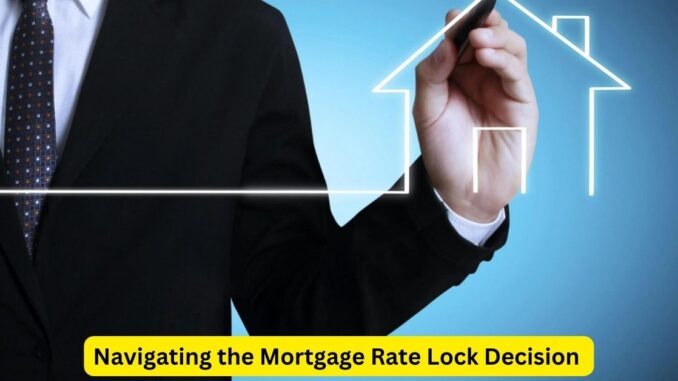
For prospective homebuyers, one of the most critical decisions in the mortgage process is whether to lock in their mortgage interest rate or float it. This decision can have a significant impact on your financial future. In this article, we’ll delve into the mortgage rate lock decision, explaining what it means and offering guidance on how to make an informed choice.
What is a Mortgage Rate Lock? A mortgage rate lock is a commitment from your lender that guarantees a specific interest rate for a set period, typically 15, 30, 45, or 60 days. During this time, your interest rate will not change, regardless of market fluctuations. This can provide peace of mind and protect you from potential rate increases.
Why is the Rate Lock Decision Important? The rate lock decision is crucial because mortgage interest rates can fluctuate daily due to various economic factors. Failing to lock in a rate exposes you to the risk of paying a higher interest rate when your loan closes. However, locking in a rate too early could mean missing out on lower rates if they become available before your closing date.
Factors to Consider:
- Market Conditions: Monitor mortgage rate trends to gauge whether they are generally rising or falling. Your lender or mortgage broker can provide insights into market conditions.
- Rate Lock Duration: Consider the length of the rate lock period. Longer locks typically come with higher fees, so balance the desire for rate stability with your loan timeline.
- Closing Timeline: Ensure that your rate lock period aligns with your expected closing date. It’s essential to leave a buffer in case of unexpected delays.
- Rate Fluctuations: If rates have been volatile, a rate lock can provide peace of mind. If they have been stable or decreasing, you might consider floating your rate for a while longer.
- Loan Type: The type of loan you’re obtaining can affect your rate lock decision. For example, adjustable-rate mortgages (ARMs) may offer a lower initial rate but carry the risk of future rate adjustments.
Tips for Making the Decision:
- Consult with Experts: Talk to your lender or mortgage broker, who can provide guidance based on your financial situation and the current market.
- Create a Rate Lock Strategy: Develop a plan that outlines when you will lock in your rate and under what conditions you might float it. Stick to your strategy to avoid impulsive decisions.
- Watch for Milestones: Keep an eye on key milestones in the homebuying process, such as the appraisal and underwriting. These can affect your rate lock decision.
- Understand Rate Lock Costs: Be aware of any fees associated with rate locks and factor them into your decision-making process.
- Stay Informed: Continuously monitor market conditions and news that could impact interest rates. But avoid making rate lock decisions based solely on short-term fluctuations.
In conclusion, the mortgage rate lock decision is a significant step in the homebuying process that requires careful consideration. While it’s impossible to predict interest rate movements with certainty, you can make an informed choice by assessing market conditions, your loan timeline, and your risk tolerance. Remember that your lender and mortgage advisor are valuable resources to help you navigate this critical decision and secure the best possible mortgage rate for your financial situation.
Leave a Reply